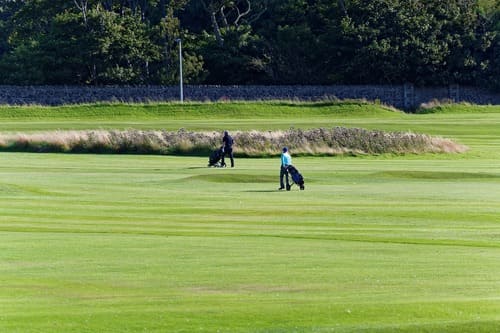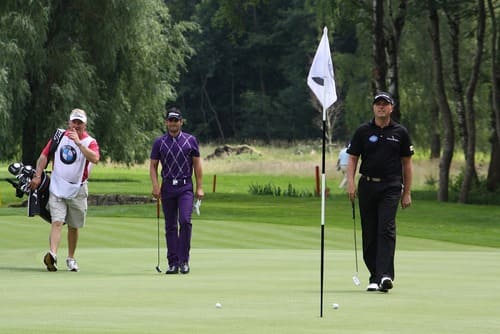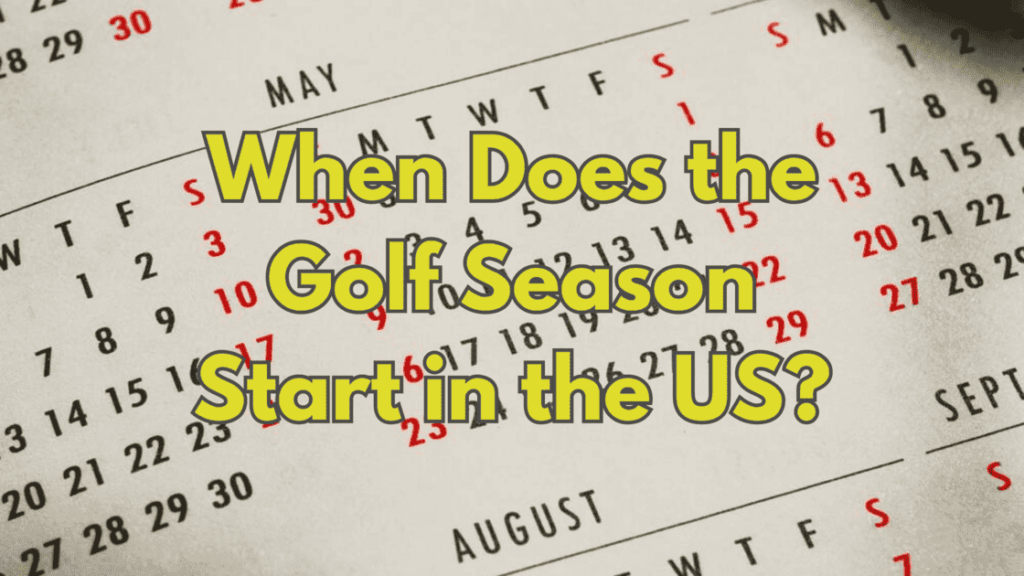Whether you’re new to golf or have been playing for a long time, you might find yourself wondering why golfers always say “fore.” What is the point of this strange tradition? Surprisingly, the word “fore” has a long history in golf that goes all the way back to the Middle Ages. But why do golfers shout fore?
Golfers shout “fore” to tell other players who might be in danger of being hit by a golf ball that has gone astray. It is important to say “fore” when there is doubt about where the ball will land and other players could be in danger. It’s hard to say for sure where the word “fore” came from in history, but it may have come from the word “forecaddie.”
Want to know where this golfer cry came from? In this piece, we take a trip through the history of golf to find out why the word “fore” is used. Get ready to be amazed by the story behind it.
Why Do Golfers Shout Fore?
If you’re on the golf course and you hear another player yell “fore,” you should get out of the way right away.
This cry is a sign that the shot wasn’t done well and is going way off course, far from where it was supposed to go. When this happens, the golf ball is more likely to hit a player’s head instead of the hole.
Golfers often add a pointing motion to their shouts to show where the ball is going. If you hear this advice and see someone pointing in your direction, you must leave the area as soon as possible.
When To Use “Fore” Yourself?
But should you always yell “fore” when you tee off?
No, not really. When you say “fore” over and over, it can be annoying to other players on the course. The rules say that you should only say this when you are taking a shot from the fairway or rough and there is a real chance that your ball might go into the playing space of another player.

In essence, you should call “fore” when you don’t know where your ball will end up or when it could be dangerous to other people. In the world of golf, it’s a good safety measure.
You should also make sure that you point in the direction your ball is traveling to give an extra warning to other players. You would want them to do the same for you, right?
What To Do When You Hear “Fore” On The Golf Course
If you find yourself in the dangerous position of hearing a “fore” cry, it’s important to know what to do.
Don’t be tempted to look up. Golf balls fall at a fast rate, giving you no time to get out of the way. Instead, get down on your knees and quickly cover your head and face. By curling into a tight shape, you can lessen the force of the ball if it does hit you.
If you can, take cover behind your golf cart for extra safety. Move quickly but smartly. This is a smart way to use your cart to protect yourself from possible painful crashes.
The Interesting History of “Fore”
In golf, the word “fore” is often used as a safety warning. This brings up an interesting question: Why “fore”? Why not use words like “be careful” or “heads up” instead?
The history of the word “fore” in golf is still somewhat of a mystery. However, there are a few different theories that are trying to be accepted.
Let’s dive in and have a look at what we believe are the 3 most likely.
Theory #1: A trip back in time to the Middle Ages
One good idea is that the word “fore” comes from the Middle Ages. During this time, the word ‘fore’ meant ‘ahead.’ Think of words like “foremost” and “foretold” from the time of Shakespeare. Given that “fore” is often used to mean “ahead,” it makes sense to say “fore” when a ball is coming.
But it does make you wonder why “fore” wasn’t paired with another word to show that the ball was moving forward.
Theory #2: Derived from “Forecaddie”
Another popular idea says that “fore” comes from the word “forecaddie,” which was used in the 1600s to describe a person who kept track of where golf balls landed. Forecaddies had to keep an eye on the golf balls and show where they landed.
Golfers would say “forecaddie” when they hit the ball to tell the person who was supposed to watch. Over time, the word ‘caddie’ was dropped, leaving just ‘fore.’ This theory gives a logical account for how the word “fore” came to be, and it also shows how the word “caddie” came to be.

Theory #3: Scottish Roots
It is widely accepted that Scotland was the birthplace of golf. So, it may be reasonable to assume that some Scottish traditions and vocabulary would be embedded in the game.
The idea is that the word “fore” came from Scotland, where golf was first played. John Knox, a famous Scotsman from the 15th century, told people to “ware before,” which means they should be careful about friendly fire from behind.
Over time, “ware before” may have changed into “fore,” which is still a warning word, but now it’s used in golf. It’s possible that the word “fore” got into gaming because it has been used as a warning in the past.
Golf “Fore” FAQs
Should you shout “fore” when playing golf?
Not every time. You should only shout “fore” if your ball could hit someone else. Point in the direction your ball is going so other players know exactly where it is going and whether or not they need to get out of the way. Remember that “fore” means “safety.”
What does the Scots word “fore” mean?
Fore is a Scottish word that means “before” or “afore.” But in old Scots, fore was used as a way to say “beware.” Many people think that the word “fore” came from old Scotland because it meant “watch out ahead.”
What do golfers shout?
Golfers only shout “fore,” but if you’re new to the game, it’s easy to not know what they’re saying. Even though golf is usually a quiet sport, you might hear the word “fore” yelled if a player thinks their ball could hit someone.
Why Do Golfers Shout Fore? – Final Thoughts
In conclusion, “fore” is an important part of golf that is used to keep everyone safe on the course. Even though its history isn’t completely clear, the word “fore” is now a standard part of the sporting language.
When playing a round of golf, make sure to say “fore” when you don’t know where your ball is going, which could put other players in danger. Add a clear gesture to this voiced warning to let other players know what’s going on.
Stay safe out there and happy golfing!






